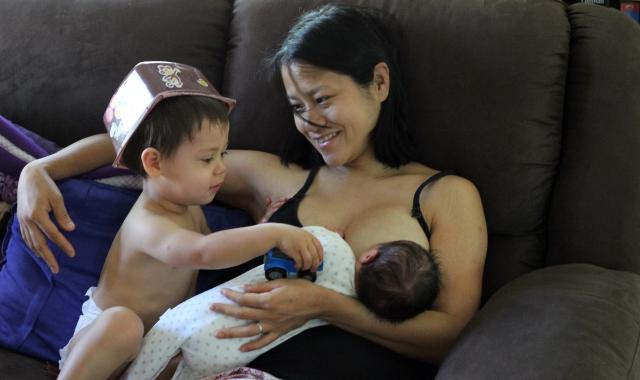Back-to-back feeds? Find out what cluster feeding means and how to cope

Cluster feeding is when your young baby's feeds are very frequent or 'clustered' together. Your baby may want to feed many times over a couple of hours. They may also be fussy during this time.
This often happens in the evening or early hours of the morning and is common in the first few months of a baby's life. It can be a difficult time, but knowing why babies cluster feed and how you can respond can help you make sense of it all.
Why do babies cluster feed?
Most babies cluster feed at times and there are a few ideas why:
Many babies seem to want to 'fill up' before sleeping for a longer period at night.
Some babies have a strong need to suck for comfort. They may become unsettled soon after coming off the breast and want another feed.
Your baby may be more unsettled in the evening if they are tired, particularly after a busy day. They need the extra comfort and closeness of a breastfeed at the end of the day.
- Frequent feeding in the early evening or during the night may help maintain your milk supply for the next day.
Did you know?
Your breastmilk changes throughout the day and night to meet your baby’s needs? For example, there is more fat and more calories in your breastmilk at the times when your breasts are less full. So even if your breasts feel softer in the afternoon or evening, your milk is still perfect for your baby. Letting baby feed little and often will help ensure they get all they need.
What can I do if my baby is fussy?
If you can, follow your baby’s lead and let them feed often. After a while, your baby will likely settle and sleep. If they're fussy at the breast, try these simple ideas:
- Feed in a quiet spot, away from distractions. You can also turn off the TV, switch your phone to silent and dim the lights.
- Help your milk to flow. Take deep breaths and stroke your breast towards the nipple to encourage your let-down reflex.
- Calm your baby. Try a warm relaxing bath or hold them skin-to-skin between feeds.
- Keep baby close. If you need to get things done, wear your baby in a carrier. A pram or rocker in the living area can help you rock or soothe baby between feeds.
How can I prepare for cluster feeding?
Cluster feeding often happens at the end of the day, when everyone is tired and things can feel hectic. You might be juggling dinner, caring for older children, or just getting home from work. Here are some ways to make this time easier for you and your family:
- Accept that evenings may be busy and sometimes stressful while baby is young. It’s okay to focus on your baby for a few hours—try to give yourself permission to let other things wait until your baby is settled or asleep.
- Prepare for this time of day. Some mums find it helpful to rest earlier in the day if they can, or to prepare an easy dinner in advance.
- Make the evenings more enjoyable. Set yourself up with drinks, snacks, and entertainment for you and any older children. You might like to listen to a podcast, read a book, or stream your favourite show while feeding.
- Ask for help from others in your household. If you have a partner, family, or older children at home, talk together about ways they can help out. Having someone else take care of household tasks in the evening lets you focus on feeding and settling your baby.
- Take breaks when you need them. If you’re feeling overwhelmed, ask someone else to cuddle, rock, or take your baby for a walk. If the weather is nice, many babies are more settled outside.
- It’s okay to ask for support and to take time for yourself when you can.
If you are concerned
Cluster feeding is common in young babies. It's not usually a sign of low milk supply. But if you're wondering about your supply, there are ways to tell if your baby is getting enough milk.
If you're still worried, your doctor can check your baby to rule out any medical issues that could make them fussy.
© Australian Breastfeeding Association November 2025



